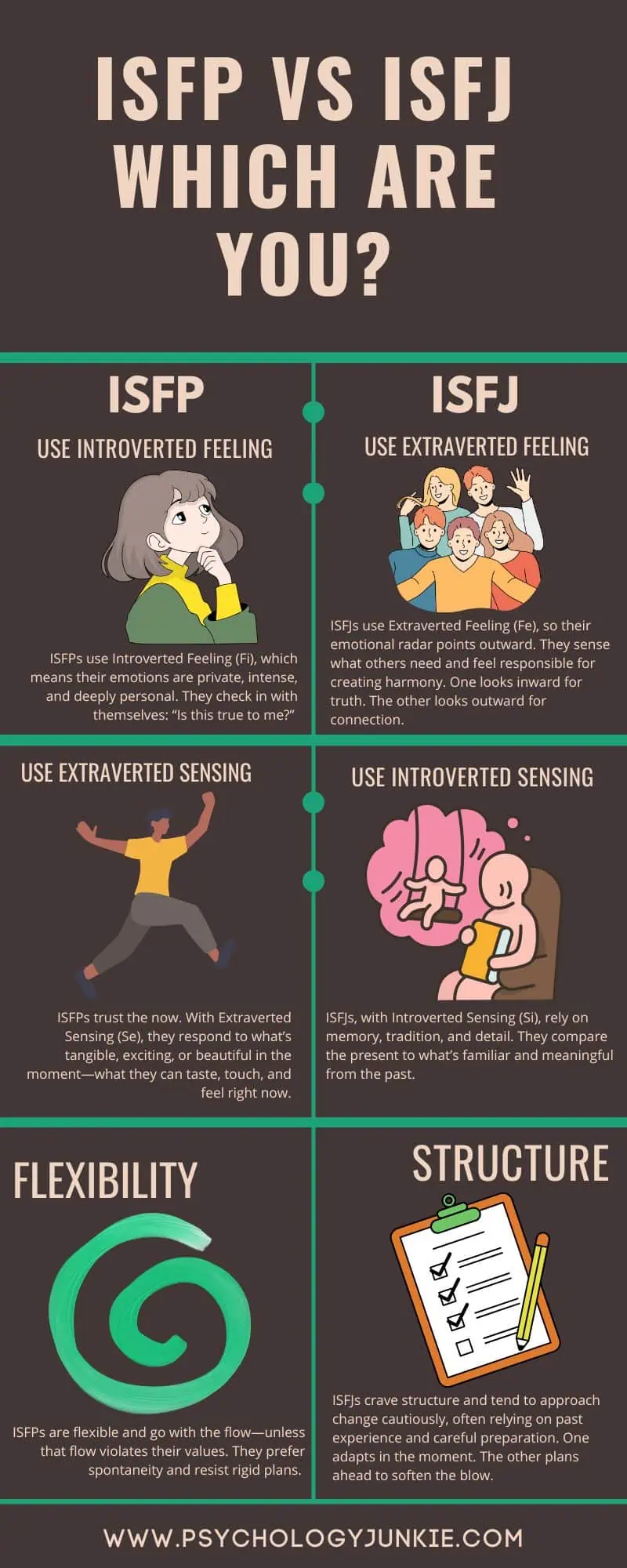ISFP vs. ISFJ: Which One Are You?
So you’ve stumbled across ISFP and ISFJ in your personality exploration and are wondering, “What’s the actual difference? They both seem quiet, sweet, helpful, maybe a little shy around loud people and fluorescent lighting.” And you’re not wrong. On the surface, ISFPs and ISFJs can look like long-lost siblings. Both are introverted, gentle, and seem like they’d rescue stray kittens or plant trees just because. But once you peek behind the curtain, you’ll find that they run on very different operating systems.
Let’s dig into the layers. Grab some tea. We’re going in.

First Up: The Function Stack Showdown
Here’s the breakdown of their cognitive functions. These are the mental tools they use to process information and understand the world around them.
- ISFJ = Si (Introverted Sensing), Fe (Extraverted Feeling), Ti (Introverted Thinking), Ne (Extraverted Intuition)
- ISFP = Fi (Introverted Feeling), Se (Extraverted Sensing), Ni (Introverted Intuition), Te (Extraverted Thinking)
At first glance, they have almost nothing in common function-wise. Which means they’re basically driving similar-looking cars with totally different engines and gears. (The ISFJ’s car is a safe, reliable Subaru with a blanket in the backseat and a first-aid kit. The ISFP’s car is modified to their tastes, has one broken taillight, and a ukulele in the trunk.)
So let’s meet the drivers behind the wheel.

ISFJ: The Steady Soul with a Heart of Gold
The ISFJ is your neighbor who remembers your birthday every year and bakes you banana bread with the good kind of chocolate chips. They’re warm, reliable, practical, and—most importantly—deeply rooted in tradition and duty. Their world runs on Introverted Sensing (Si), which means they notice the little details, find comfort in familiarity, and remember how you like your coffee even when you forget.
For the ISFJ, familiarity and stability are key. They don’t like flying by the seat of their pants and tend to keep their lives organized and consistent.
Their secondary function, Extraverted Feeling (Fe), is all about creating harmony. ISFJs are the types who feel it in their bones when someone’s uncomfortable in the room. They don’t want attention for what they do, but they do want everyone to be okay. Fe gives them this drive to be socially graceful, appropriate, and caring. Basically, they’re the type to apologize when you bump into them.
They follow it up with Introverted Thinking (Ti), which adds a quiet, logical undercurrent to their caring. And in the far-backseat, Extraverted Intuition (Ne) occasionally pipes up with a “What if we tried something new?” and the rest of the system replies, “Shhh, not today.”
ISFP: The Quiet Rebel with Paint on Their Jeans
Now the ISFP is a different flavor of gentle. They may also be quiet, sweet, and helpful—but they don’t give a single sock about tradition unless it resonates with their soul. Their life is a canvas, and they’re determined to make it mean something. They run on Introverted Feeling (Fi), which is like having a compass that only works if you’re being true to yourself.
Fi doesn’t care what’s expected. It cares what’s right—deep, internal right. Which means ISFPs won’t necessarily follow the rules. In fact, rules might make them itch. If the ISFJ is asking, “What’s the proper thing to do here?” the ISFP is asking, “What feels aligned with my heart?”
Their secondary function, Extraverted Sensing (Se), makes them grounded in the moment. They’re all about the here and now—taste, touch, sound, color. That’s why so many ISFPs end up drawn to the arts, fashion, music, photography, hiking, or just…wandering around soaking in the world’s textures like sensory sponges.
Their third function, Introverted Intuition (Ni), gives them mysterious flashes of insight or symbolism. It’s less structured than Si but more aspirational. They may not articulate their life plan, but they feel like there’s a greater vision they’re following.
And at the bottom? Extraverted Thinking (Te), which comes out when they’re stressed—suddenly barking orders or trying to “fix” their messy lives in a last-ditch panic to impose order.
Feeling Types: Fe vs Fi, the Eternal Showdown
Here’s one of the biggest ISFJ vs ISFP differences: how they process values and emotions.
ISFJs (Fe): They tune in to how everyone else is feeling. Their emotional awareness is outer-oriented. They’re often the first to notice when someone in the group is off, and they instinctively adjust to bring comfort and connection. They’ll say what’s polite or expected if it smooths the vibe—even if it’s not 100% authentic to them.
ISFPs (Fi): Their feelings are deep, intense, and fiercely private. They don’t wear their hearts on their sleeves—they store them in an encrypted vault. But make no mistake, those feelings are running the show. If an ISFP’s gut says no, it’s a no. They value emotional integrity over social harmony, which means they’re more likely to go against the grain if it protects something sacred inside.
TL;DR:
Fe asks, “What’s right for everyone?”
Fi asks, “What’s right for me?”
This isn’t selfish vs selfless—it’s internal vs external calibration. One seeks harmony. The other seeks authenticity.
How They Handle Conflict
Picture this: Someone is being rude at a family gathering.
- The ISFJ clenches their fork tighter and politely asks if anyone wants more potatoes. Later, they vent to a close friend and wonder if they should’ve said something, then feel guilty for venting.
- The ISFP silently withdraws, eats their mashed potatoes in the backyard, and writes a poem about emotional toxicity and ancestral wounds. If pushed too far, they might unleash a calm but scathing monologue about boundaries and personal respect.
For the ISFJ, being polite, tactful, and considerate is key. For the ISFP being authentic, genuine, and respecting personal boundaries is key. While both types value all those things, the ISFJ will try to find the most tactful, gentle way to reprimand the person involved while the ISFP either A) leaves, or B) states outright that the other person is being a jerk and explains why.
Aesthetics and Expression
Both types tend to be aesthetically sensitive, but in different ways.
- ISFJ aesthetics: Cozy Pinterest-core. Clean lines. Meaningful keepsakes. Calendars with stickers. Candles that smell like “nostalgia.”
- ISFP aesthetics: Earthy chaos. A thrifted scarf with emotional significance. A room decorated with dried flowers and one aggressively expressive painting they made during “a moment.”
As an example, I know quite a few ISFJs who have homes where every color is coordinated, and every piece of decor has some kind of nostalgic value to it. They enjoy cozy but clean, a room filled with sentimentality that doesn’t look like grandma’s attic threw up in it.
I know several ISFPs who collect animal bones, teeth, or various otherworldly items that give them a sense of wonder or oddity. They like things that have symbolism, personal significance, and feel inspiring in some way. It’s less about nostalgia or clean lines and colors and more individualistic.
Stressed Out and Spiraling
Now here’s where things get spicy.
ISFJ under stress: They might go full-on neurotic. Suddenly they’re nitpicking the silverware drawer and catastrophizing the future. Their inferior Ne wakes up and starts shrieking: “What if everything falls apart? What if we made the wrong choice? WHAT IF THIS IS THE BEGINNING OF THE END?” They get trapped in anxious spirals, obsessed with possibilities they normally ignore.
ISFP under stress: When overwhelmed, they can’t find their emotional center. Their inferior Te kicks in like a robot malfunctioning on coffee: “WE MUST FIX OUR LIFE IMMEDIATELY. THROW AWAY EVERYTHING. START A BUSINESS. LEARN TAXES. FIX EVERYTHING NOW.” But it’s usually sloppy, panicked, and unsustainable.
Relationships: Love Languages and Landmines
In love, both types are tender, loyal, and quietly romantic. But the ISFJ wants connection and care to be felt, reciprocated, and understood—like a warm, secure hug that never ends. The ISFP wants their soul to be seen, respected, and not messed with.
ISFJ love issues: Over-accommodating. People-pleasing. Holding in resentment until it spills like soup from a too-full bowl.
ISFP love issues: Ghosting in the name of emotional self-protection. Withdrawing when misunderstood. Resenting conformity and emotional control.
ISFJ wants: “Let’s make a life together. With meal plans.”
ISFP wants: “Let’s live our truth. With lots of solo time and no judgment.”
Careers and Callings
Both types can thrive in the helping professions, but their motivations differ.
ISFJs want to serve people and create comfort and structure. They’re the nurses, teachers, social workers, and administrators who keep everything from collapsing.
ISFPs want to express themselves and live authentically. They’re the artists, musicians, stylists, tattoo designers, photographers, and therapists who make you feel something.
An ISFJ wants to help you feel safe.
An ISFP wants to help you feel alive.
That said, this isn’t cut and dry. I’ve known ISFP nurses and ISFJ songwriters. This is simply a trend. Many ISFJs are drawn to helping professions where they can make a positive impact in others’ lives through facilitating, teaching, mentoring, or taking care of the details. Many ISFPs crave jobs that allow for individual expression for themselves or others.
Summary: How to Tell Them Apart
Ask yourself:
- Do they value tradition and predictability (ISFJ), or freedom and personal meaning (ISFP)?
- Are they moved to adapt to people’s feelings (ISFJ), or honor their own values above all (ISFP)?
- Do they have a calendar with birthday reminders for everyone (ISFJ), or do they make impulsive art inspired by heartbreak and sunlight (ISFP)?
- Are they more likely to vent their emotions in conversations (ISFJ), or bury them in moody silence so they can process alone (ISFP)?
At their best:
- ISFJs are kind, dependable, emotionally intuitive, and deeply nurturing.
- ISFPs are authentic, creative, emotionally intense, and profoundly individualistic.
At their worst:
- ISFJs become anxious, controlling, stuck in routines, and desperate for harmony.
- ISFPs become withdrawn, impulsive, irresponsible, or emotionally explosive.
But at their truest—they’re both deeply feeling, perceptive humans trying to make sense of life in a chaotic world. They just do it in radically different ways.
What Do You Think?
Did this article help you to find your true personality type? Do you have any insights to share with fellow readers? Let us know in the comments!







This was a really helpful article.
I have been torn between ISFJ and ISFP for a couple years.
I see now that I am an ISFP 9w1.
Thank you for this blog. Looking forward to more. 🙂
Great article! As ISFP, I didn’t even realize that I shared certain traits with ISFJ. But the determining factor in almost any issue boils back down to authenticity. Does this feel like me? If it doesn’t, I leave it out, or I eventually disconnect from it because I can’t sustain it.
This article was very helpful to me. I thought I was an ISFP, but, I have a lot in common truly with the ISFJ personality. I am a combo! Thanks for clarifying each type.
Me too. Combo.
I am definitely an ISFJ. I have been married for 35 years to another personality (let’s say the ISFP) . He fits a lot of the characteristics although he won’t take the personality test. Just to humor me, I asked, but no . My question is “am I with the personality type that is right for me?”
As I ponder this question I am realizing more about myself and I am happy with my discoveries. But I keep asking this question and wondering what it means, if anything. Thanks for any input.